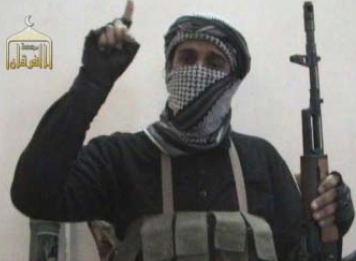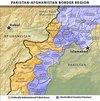|
|
|
Abu Suleiman al Otaibi, from an Islamic State of Iraq propaganda video. Image via the NEFA Foundation. |
Pakistan remains a haven for Taliban and al Qaeda fighters to conduct operations in Afghanistan. Thirteen Taliban, including a deputy of Mullah Nazir, a senior Taliban leader in South Waziristan, were killed in a clash with NATO and Afghan forces in the eastern Afghanistan province of Paktika. In a separate clash, two al Qaeda leaders, including a former leader in al Qaeda’s Islamic State of Iraq, were killed during fighting in neighboring Paktia province.
US and Afghan forces killed Maulana Iqbal and 12 other Taliban fighters in a major clash in Pakitka province. Twelve of the 13 Taliban killed during the fighting were from Pakistan, The Hindu reported. Nine of the Taliban were from South Waziristan, two were from Punjab province, and one was from Hyderabad in Sindh province. The bodies of the Taliban fighters have been sent back to Pakistan for burial.
Iqbal is said to have led more than 30 Taliban from Pakistan to attack US forces in Uruzgan province in southwestern Afghanistan. Iqbal is the deputy of South Waziristan Taliban leader Mullah Nazir, who has been touted as a “pro-government” Taliban tribal leaders because he opposed the presence of Uzbek fighters in South Waziristan.
Nazir fought Taliban forces led by Baitullah Mehsud in the spring of 2007, but sat out of the fighting between the Pakistani military and Baitullah’s forces in the summer and fall of 2007.
The Pakistani government and the Taliban are negotiating an end to the fighting in South Waziristan and the greater Northwest Frontier Province. The Taliban are observing a truce of sorts, but the Taliban are conducting small-scale attacks against Pakistani security forces as well as several small suicide attacks throughout the region. The Pakistani government is seeking to end attacks in Pakistan, but is not requiring the Taliban to stop attacks inside Afghanistan.
Two al Qaeda leaders killed in Afghanistan
The same day that Iqbal and the 11 Pakistani Taliban were reported killed, al Qaeda announced the death of two of its operatives in Afghanistan. Al Ekhlaas, an al Qaeda forum, announced the death of Abu Suleiman al Otaibi and Abu Dejana al Qahtani during a battle in Paktia on an unspecified date.
Al Otaibi is described as the former leader of the legal system of al Qaeda in Iraq’s political front, the Islamic State of Iraq. Abu Uthman al Tamimi is listed as current minister of the Islamic State of Iraq’s sharia, or Islamic law, council.
Abu Dejana al Qahtani was also reported killed along with al Otaibi. Information on Qahtani is not currently available.
Al Qaeda in Iraqi is reported to have sent hundreds of fighters to train in al Qaeda camps inside Pakistan. Atiyah Abd al Rahman, a Libyan member of al Qaeda, serves as the liaison between al Qaeda’s central command in Pakistan and al Qaeda in Iraq.










7 Comments
The Marines, with British assistance, are steadily establishing themselves in the Garmsir area. I’m surprised there hasn’t been any information about Taliban casualties released for those operations as of yet.
From the Front Lines
From my friend Bill Roggio at the Long War Journal:
US and Afghan forces killed Maulana Iqbal and twelve other Taliban fighters in a major clash in Pakitka province. Twelve of the 13 Taliban killed during the fighting were from Pakistan, The Hindu repo…
From the Not So Front Lines
From my friend Bill Roggio at the Long War Journal:
US and Afghan forces killed Maulana Iqbal and twelve other Taliban fighters in a major clash in Pakitka province. Twelve of the 13 Taliban killed during the fighting were from Pakistan, The Hindu repo…
I’m curious to know when the first signs of AQI showed up in the region to receive training. I’m wondering if their training and then subsequent assignments to fight in AF are a sign of recognizing their inevitable defeat in IQ or just part of their training before they are to return? I’m thinking at some point they will cut their losses in IQ and fortify their positions in Pakistan and AF.
It would appear that our intelligence is becoming much more effective based on the successful attacks on the Taliban leadership. Michael Yon believes that we are in trouble in Afghanistan. Do you concur?
Good questions ST333.
Abu Suleiman al Otaibi left Iraq about six months ago (according to the translated communiqu
I saw a video where it showed the 101st’s AO is eastern A-stan, is this true? There are incidents almost everyday in this area, but US troops can’t legally cross the P-stani border, into an area called “Talibanistan”. They have free reign there, and it looks like the P-stani gov. is not interested in stopping them. The next POTUS may-or have to make a decision regarding these camps and safe havens just across the Afghan border. This is VERY frustrating.